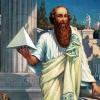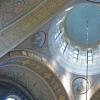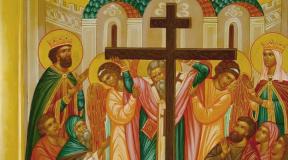What a church holiday on August 2nd. The main prohibition on this day is swimming in open water
Orthodox and Greek Catholics celebrate on August 2 the feast of Elijah (Elijah) - the first of the most respected innocent. In churches on this day, cross passages and blessing of water take place where there are sanctuaries in honor of the prophet.
Prophet Ilya
Every year, the Orthodox celebrate on August 2 the feast of Elijah - the prophet who lived in Palestine in the 9th century. up to our era From a young age he settled in the desert and lived there in fasting and supplication. Elijah was summoned to prophetic service during the reign of the idolater king Ahab, who bowed to Baal (the sun) and forced the Israeli population to act in a similar way. God sent Elijah to Ahab and ordered to tell him that if the population did not turn to the real Lord in any way, his kingdom would know a crisis. Ahab did not obey the prophet in any way, and waterlessness and great trouble set in in the state.
During the period of dangerous fasting by famine, the prophet lived in the wilderness. Then he found shelter for two years with a widow in the town of Zarepta. Then he returned to the Kingdom of Israel and declared to the sovereign and the whole people that all the misfortunes of the Israelites, without exception, are due to the fact that they forgot the true Lord and began to worship the image of Baal.
Baal

First, they made an altar to Baal, threw firewood, slaughtered the bull, and the Baal priests began to offer prayer to their own god. In the evening, Elijah made his own altar, laid the logs, sprinkled them with water and began to offer prayer to God the Lord. Suddenly, a flame descended from the sky and hit not only the logs and the victim, but also the water and the stones of the altar. The population, noticing this magic, glorified the true Lord and again believed in him.
Elijah the Prophet (feast of August 2) was taken to heaven in a fiery chariot. The seer Elisha was an eyewitness to this wondrous ascent. Then, in the Transfiguration of the Lord, someone appeared together with the prophet Moses and appeared before Jesus Christ.
According to legend, the seer will become the Forerunner of the 2nd coming of Christ and during the preaching period will acquire physical destruction.
History

Ilya the seer is the most famous blessed of the common people. And for this reason, there is no doubt that August 2 (Ilya's holiday) is provided with traditions, customs and beliefs. In popular beliefs, Ilyusha the seer appears in the form of a powerful gray-haired old man who rides around the boundless sky in his own chariot. His punishing hand sends out fiery arrows, shaking demons and people who do not in any way adhere to the decree of the Lord. Wherever the seer arises, he is everywhere engulfed in flame, nightmare, doom and decay. He symbolizes the fury of God and, according to the whole of Russia, Elijah the prophet was called only as severe.
Traditions
The traditions of August 2, the feast of Elijah, have pagan origins. During this period, the ancient Slavs respected the Lord of Thunders Perun. And only after the baptism of Rus, under the influence of the Orthodox church, the appearance of the pagan deity over time changed in the public consciousness of Elijah the prophet. He embodied all the functions of the Thunderer without exception.

In absolutely all legends it was described that Elijah the seer expresses the Lord's rage. His punishing, just hand punished the spirits of the crown, and especially the evil demons. According to the belief of people, all evil spirits are protected from its formidable arrows, transforming not only into unbridled animals (hares, foxes) and low worshipers, but also into everyday ones: a dog, cats and others.
Therefore, a tradition arose not to let dogs and cats and other household pets out into the street, so that the spirits of darkness, who found refuge in them and fleeing arrows, did not make their way into the house, and the discharge directed at them did not hit the house.
In Ilya, on August 2, they certainly wash themselves with spring water. It protects against diseases and deterioration of health.
Especially on this day, beware of pines with 2 peaks. If there is a thunderstorm, then all doors and windows to the dwelling, without exception, are covered, lamps and candles are lit in front of the icons. After a thunderstorm, they collect rain water. It has healing power and protects against the evil eye.
On the Orthodox holiday of August 2, Elijah the prophet prescribes not to work in the garden. The seer is able to defeat the worker with lightning, or burn the grass. Only one type of work is officially allowed - this is the survey of the hives and the first reduction of combs in the bee-house. According to legend, the evil spirits are afraid of bees and never approach them.
Signs

The fact that the Seer is the master of thunder, lightning, whirlwinds and rain clouds has given rise to many portents. You can believe in the holiday of Ilya 2, as a rule, they are true. Attention should be paid to the following precursors.
- You shouldn't plunge into Ilyin's day - he wrote in water.
- Since Ilyin's day, all the liquid has cooled.
- Before Ilya, the man bathes, and with Ilya, he says goodbye to the river.
- Thunder rumbles - in this case, Ilyusha in his own chariot moves across the sky.
- Ilya takes the harvest, and ends the season.
- You cannot work in the Ilyin period in the earth, otherwise it will burn with an azure flame.
- As far as Ilya, the clouds go according to the wind, and with Ilya, they start to go contrary.
- Before Ilya, the priest will not beg for a shower, and after Ilya the woman will drive him with an apron.
- After Ilyin's day, you can't find a horse in the garden of a seaw - look how impenetrable the nights are.
- It's been a night of duty since Ilyin: the worker is getting enough sleep, and the stallions are eating up.
- Those who hit the Ilyin period in the rain will always be in excellent shape.
- Whoever thinks heaps in Ilya will lose all the good without exception.
What can you do?
Signs on the holiday of Ilya on August 2 are simple and understandable. You cannot work on this day. But what can you do despite popular beliefs?

Every religious person on this day will definitely go to the temple. Since it is on the second of August that festive services are held in them in honor of In addition, cross passages are arranged. After the services, families gather for a gala dinner. People who specialize in arable farming have every chance at this period to ask Elijah for an excellent harvest.
What shouldn't be done?
What cannot be done on the feast of Elijah on August 2 so as not to send trouble upon yourself? During a thunderstorm, it is forbidden to be in the water, near trees, near a pine tree with 2 peaks, run down the street, speak loudly, hum, scream.
Grandmothers taught descendants in such bad weather to close the door close, hang the windows, set fire to either an icon lamp or a candle (Epiphany or Thursday) in front of the icon, then cross themselves and everyone without exception, asking Elijah the Prophet to free their loved ones from the shaking thunder, from the unstable arrow. With this rite, there must certainly be a handkerchief. To save their own dwelling and yard, the steppe, animals from lightning, people fumigated everyone, without exception, with incense in the evening before the holiday, and in the daytime of the next day.
It is believed that during this period it is impossible to carry out practically any work related to the land and dwelling, so as not to anger the holy prophet. There is a legend among the people that activities in the garden have every chance of causing the death of the crop. It is not prohibited on this day only to carry out activities related to bees and caring for them. Allowed on a holiday to carry out the preparation of wax for the production of candles.
Why can't you get into the water?

It is impossible to swim after August 2, the church holiday of Elijah, since the seer, according to legend, had cooled the water by this time. The proverb is also known among the people: "A seer muddies water in the rivers."
The second opinion, why swimming after Ilyin's day should not be, notifies that this is harmful to well-being. Since from this period the water in the ponds begins to bloom - this will not have the best effect on the body.
It is generally accepted by the people that the swimming season ends on August 2, the air temperature at night becomes much lower than daytime. Similar differences are reflected in the water.
Another of the factors that made society in the old days afraid to plunge after Ilyin's day - feral animals and evil forces. If you trust the popular superstitions, then on the night of August 2, evil spirits are found near reservoirs - water, mermaids, demons. As if they are taken to refuel in rivers and lakes from that time. For this reason, the threat of drowning is very great - a person will not be able to come to his senses in any way, as an inhuman will take him and drag him along with him.
On August 2, 3 Orthodox church holidays are celebrated. The list of events informs about church holidays, fasts, days of veneration of the memory of saints. The list will help you find out the date of a significant religious event for Orthodox Christians.
Orthodox Church Holidays August 2
Prophet Elijah
Timed to one of the greatest prophets - Saint Elijah (IX century BC). It is believed that he was taken to Heaven in a chariot of fire alive. They pray to him during a drought for the gift of rain. In Russia, he is considered the patron saint of the Airborne Forces and the Air Force. The people call this holiday Ilyin's Day.
Who doesn't know the prophet Elijah? I think everyone knows him, even atheists. However, the Old Testament takes it to such a distant past that it becomes completely inaccessible to us. In the memory of most people, the associative array associated with this most unique person turns out to be either half-fabulous: if thunder is thundering, it is "Ilya the prophet rides across the sky in a chariot", or completely everyday: "Ilya the prophet is a mowing time." That, in fact, is all.
So who is he really, the prophet Elijah? He is a saint. But a saint who could take a sword and stab 450 false prophets. He is "like in Heaven," but he did not die. He is an Old Testament righteous man, but he reveals an amazing new truth about God.
Elijah's feat can be better understood if we think of him in modern terms. He lived almost three thousand years ago. He lived in a society where the bulk of people broke away from their native faith. They called themselves Israelites by name, by way of life they were rude pagans. Vices, witchcraft, godlessness, cynicism and injustice. Isn't it very similar to our present day?
Now imagine that a person who is not quite adequately dressed walks along our asphalt streets and denounces all citizens of their sins and atheism. Let us assume that in some amazing way he was not admitted to a psychiatric hospital, like the Monk Amphilochius of Pochaev. They didn’t go to prison because they were afraid ... and respected. Of course, he's crazy, but it's better not to touch him.
When lawlessness became universal, God punished the Israelites with drought. The disaster lasted three and a half years, and all this time the Lord was waiting for repentance from His people. But he was not there. There was no rain either.
The prophet who proclaimed the wrath of God suffered as much from the drought as everyone else. At first he lived by the stream, and the raven brought him food. But the brook dried up, and the Lord sent Elijah to Zarepta of Sidon, to another state, to a certain pious widow.
“There were many widows in Israel in the days of Elijah, when heaven was shut up for three years and six months, so that there was a great famine throughout the whole earth, and Elijah was not sent to any of them, but only to the widow in Zarepta of Sidon” (Lk 4: 25-26), - said Christ to the Pharisees, emphasizing the constant weakness of the faith of the Jewish people.
That is, there was not enough pious person in all God's chosen people to send a prophet to him. And not only in Israel, but also in the neighboring faithful Judea, God did not find a place of rest for his servant. But God is impartial, and the humble faith of a stranger, even whose name the Bible did not preserve, turned out to be more precious in God's eyes than the arrogance of the “sons of Abraham”.
How do we know about the humility of the poor widow? In the first words she spoke:
“As the Lord your God lives! I have nothing baked, but only a handful of flour in a tub and a little oil in a jug; and now I will gather two pieces of wood, and I will go and prepare it for myself and for my son; let us eat it and die ”(1 Kings 17:12).
Look: "As the Lord thy God lives." A woman believes in true God and recognizes Him as Lord, Creator of Heaven and Earth. Knows the prophet in the face, because he does not even ask him who he is. And at the same time she humbly places herself outside the "legitimate" worshipers of God, outside the Jewish people, emphasizing this with the word "yours." And further, when Elijah assures her in the name of God that for the sake of him, the prophet, the flour and oil in her house will not run out until the hunger recedes, the widow does not reread, does not doubt, but immediately fulfills what she said. Truly, she is an Old Testament "Samaritan woman" and deserves all respect.
Meanwhile, the drought has continued for the fourth year. The country is so hungry that even the king has nothing to feed and water his cattle. And so the king of Israel - the wicked idolater Ahab - decided to look for new pasture and water for his horses. And then he was told that the prophet Elijah wanted to see him. And, as the Bible says, “Ahab went to meet Elijah” (1 Kings 18:16). How stingy the chronicler is with words! However, in many places the biblical language is extremely restrained.
I see much more behind this brief statement of fact. How can a king "go"? How does the king “go out” and “go” in general? And from other biblical texts, and from our lives, we know that the ruler does not walk alone - he is surrounded by his retinue, squires, guards. And the use of the singular verb in this case is a simple metaphor. It is logical to assume that here Ahab “went” to meet Elijah not alone, but surrounded by his retinue. So, let's try to imagine this, but to make it easier and more convenient for us to understand the fullness of the picture, let's imagine how it would look now.
A cortege with flashing lights is moving at high speed, police motorcycles in front and behind, and an armored limousine with tinted windows in the center. In the middle of the road, a lonely silhouette of Elijah rises. And the procession stops! Which of the modern spiritual authorities can stop the presidential cortege by their appearance? I do not mean church hierarchs. I mean the authority of the spirit. I, unfortunately, do not know such people. Getting out of the limousine ... Ahab.
"Are you embarrassing Israel?" (1 Kings 18:17) - says Ahab, and his bodyguards in jackets and ties look at the prophet with anger and fear. "It is not I who confuse Israel, but you and your father's house, by the fact that you have despised the commandments of the Lord and follow the Baals" (1 Kings 18:18), the prophet answers.
To whom of the current rulers of the world cannot these words be applied? Unfortunately, I do not know of those. It seems to me that when the prophet uttered these words, his gaze burned with fire, and his face was bright, like the face of Moses, for Divine zeal kindled his heart.
The saint offered the king a test: he, Elijah, would meet with the servants of Baal on Mount Carmel, so that each side would make a sacrifice of itself. Whose sacrifice the Lord accepts with fire, he will confess the true God. And now 450 people - enemies of God, false prophets - gathered to confront Saint Elijah. 450 Wang, Blavatsky, Globe, Malachs and Copperfield. From morning to evening, the prophets of Baal prayed to their gods, recited mantras and stabbed themselves with knives in a frenzy. Surely, among them were real sorcerers (not all swindlers!), Having demons under their control. Probably, at another time they could perform various "signs" and "miracles", but now, in the presence of the manifest power of God, all the demonic power wilted, weakened and abolished. The demons moved away and nothing happened. Saint Elijah stood aside and made fun of the prophets of Baal, galloping around the altar:
When it was his turn to pray, Saint Elijah built an altar of stones, laid out firewood, prepared a calf, dug a ditch and ordered to pour water over everything three times, so that the miracle of God would be revealed even more clearly. And the Lord heard his laconic, fiery prayer and came down with fire, burned up the calf, and the altar, and the water around it. And all the assembled people fell on their faces, exclaiming: "The Lord is God!"
O feeble Jewish people in faith! How many times have you shouted like this, and within a moment you betrayed your Lord. So it was at Mount Sinai, when Moses slowed down on the top, and people did not hesitate to make a molded idol for themselves. So it was after the division of the Jewish kingdom into Judah and Israel, when Israel's king Jeroboam installed two golden calves to distract his subjects from the Jerusalem temple. And the people were not outraged that they were being distracted from God the Almighty to the demons, they did not arrange either an uprising or a revolution, but quite calmly changed the object of worship. How much they didn't care! But they had a reliable teaching about angels and demons and knew the whole truth about the "gods of silver and gold." Only little did they believe this teaching ... So it was later, under Christ the Savior. So it was under Elijah.
As soon as everyone saw the miracle of God in the descent of the heavenly fire, then the miraculous rain according to the word of the prophet, as on the same day the godless Queen Jezebel threatened to deal with Elijah in revenge for killing her false prophets. And no one stands up for him: neither King Ahab, who wept after these miracles (1 Kings 18:45), nor the people who saw the holiness of the prophet.
The heavenly fire descends on the sacrifice of the prophet! It is enough to watch at least a video of the descent of the Holy Fire on the Holy Sepulcher on Holy Saturday to try to understand what was happening then on Mount Carmel. One can easily imagine universal enthusiasm, fear of God and awe. The prophet himself, imbued with this enthusiasm and zeal for God, fled before the king's chariot from Mount Carmel to the city of Jezreel, where Ahab's residence was, and this is more than 30 kilometers (1 Kings 18:46). But the miracle did not enlighten Ahab's wife, the idolater Jezebel, and, fleeing her anger, Elijah hid in neighboring Judea, in the city of Bathsheba.
Monk Abraham of Galich, Chukhloma, abbot
Honoring the memory of Saint Abraham (XIV century), the enlightener of the Galich country. Founder of 4 monasteries dedicated to the Most Holy Theotokos.
The Monk Avraamy of Galich, of Chukhloma, lived and asceticised in the fourteenth century in the monastery of the Monk Sergius of Radonezh. After many years of art, he was awarded the priesthood. Striving for complete silence, he asked for the blessing of St. Sergius and withdrew in 1350 to the Galich country inhabited by the Chud tribes. Having settled in a desolate place, the Monk Abraham, by revelation, crossed over to the mountain, where he found an icon of the Mother of God shining with inexpressible light. The appearance of the holy icon became known to the Galich prince Dimitri, who asked the monk to bring it to the city.
The Monk Abraham came with the icon to Galich, where he was greeted by the prince and a host of clergy. Numerous healings took place from the icon of the Mother of God. Prince Demetrius gave the Monk funds for the construction of a temple and a monastery near Lake Chukhloma, at the site of the appearance of the icon of the Most Holy Theotokos. The temple was built and consecrated in honor of the Dormition of the Most Holy Theotokos. The newly built monastery of the Monk Abraham became a source of spiritual enlightenment for the local Chud population.
When the monastery was strengthened, he put his disciple Porfiry in his place as abbot, and he himself retired 30 miles away in search of a secluded place, but the disciples found him there too. So there was another monastery with a temple in honor of the Position of the Robe of the Mother of God, called "the great desert of Abraham." The Monk Abraham twice withdrew to remote places, after the silent people gathered again to him. Thus, two more monasteries were founded - one in honor of the Cathedral of the Most Holy Theotokos, of which the Monk Abraham appointed Abbot Paphnutius, and the other in honor of the Protection of the Most Holy Theotokos.
In the Intercession Monastery the Monk Abraham finished his earthly life. He reposed in 1375, having passed the abbot to his disciple Innocent a year before his blessed death. The Monk Avraamy was the enlightener of the Galich country, having founded four monasteries in it, dedicated to the Mother of God, who revealed her icon to him at the beginning of his devotional labors.
Uncovering of the relics of the Monk Martyr Athanasius of Brest, abbot
The MonkMartyr Athanasius was born around 1595-1600 into a poor Orthodox family, probably an impoverished nobleman (judging by the fact that the future hegumen served as a teacher at the court of the magnate). Perhaps he was from a family of an urban artisan - as he himself points out in his memoirs, calling himself "a Nedzym Man, simple, garbarchik, poor kaluger." As is often the case, we have no information either about the place of birth or about the secular name of the saint; it is also unknown what the name "Filippovich" is - a surname or patronymic.
Probably, Athanasius received his elementary knowledge in one of the fraternal schools, where, taught the Greek and Church Slavonic languages, the word of God and patristic creations, highly educated people who could resist Uniate violence and Catholic proselytism were trained. But the education received at the fraternal school did not completely satisfy the inquisitive young man, and he studied at the Vilna Jesuit college, where young people of all Christian denominations were admitted.
The young scientist began his service as a home tutor in the houses of the Orthodox and Catholic gentry, but in 1620 his life fell into a different direction: Filippovich, who positively proved himself to be rich in knowledge, good manners and indisputable pedagogical talent, was invited by Hetman Lev Sapega, Chancellor of the Grand Duchy of Lithuania ... The hetman entrusted him with howling a certain "Dmitrovich" presented to Athanasius by the Russian Tsarevich John - allegedly the nephew of Theodore Ioannovich who died in 1598, the grandson of John IV the Terrible from his youngest son Dimitri, under whose name several impostors acted in 1604-1612. One of these "pretenders" was the father of the disciple Athanasius, whom the Poles were preparing for the Russian throne: Dimitri-Mikhail Luba, who was killed in Moscow during a rebellion against the militia of False Dmitry I. Mikhail Luba's wife Maria died in prison, and a certain Wojciech took his young son Belinsky, who brought the child to Poland and passed off the son of Dimitri and Marina Mnishek, who was actually hanged. All this was announced at the Diet before the king, who entrusted the upbringing of Ivan Dimitrievich to Lev Sapega. He appointed the maintenance of the "prince" at six thousand zlotys a year from the income of Brest and the Brest povet.
For seven years, Afanasy served as the "inspector" of the false tsarevich, gradually coming to the conviction that this "certain Tsarevich of Moscow", "a certain Luba", "and who does not know about himself what he is," is another impostor. This confidence increased over time, especially when the content of Luba decreased to a hundred zlotys a year, and hetman Sapieha himself somehow escaped: "Who knows who he is!"
Having become an unwitting accomplice in the political intrigue against the Moscow sovereign, the famous defender of Orthodoxy, Mikhail Fedorovich Romanov, the son of the Russian patriarch Filaret, Filippovich left the chancellor's court in 1627 and retired to the cell of the Vilna Holy Spirit Monastery, where he soon received tonsure from the governor Joseph Bobrikovich. Soon, with his blessing, Athanasius passed obedience in the Kuteinsky monastery near Orsha, founded recently, in 1623 by Bohdan Stetkevich and his wife Elena Solomeretskaya (V. Zverinsky. Materials for historical and topographic research. St. Petersburg 1892 p. 172), and then - in the Mezhyhirsk monastery near Kiev, at the hegumen of the Commentary (mentioned under 1627) and the brother of the Kiev Metropolitan Job Boretsky - Samuel. However, already in 1632, the Abbot of Mezhigorsk released Athanasius to Vilna, where he was ordained a hieromonk.
The next year, Athanasius again left the monastery of the Holy Spirit and went as the abbot Leonty Shitik's abbot to the Duboyn monastery near Pinsk, also under the command of the Vilna monastic monastery, where he spent three years in care of the brethren, fasting and prayer.
In 1636, an ardent supporter of Catholic proselytism Albrecht Radziwill, violating the Articles of Reassurance published by King Vladislav IV, forcibly expelled the Orthodox inhabitants from the Duboyn monastery in order to hand over the monastery to the Jesuits, who had recently settled in Pinsk through the efforts of the same Albrecht. Athanasius, unable to resist the magnate and keep the monastery, made a complaint with a narrative about the lawlessness committed, but this written protest, signed by many Orthodox Christians, did not bring positive results.
Expelled from the holy monastery, Afanasy Filippovich came to the Kupyatitsky monastery to the hegumen Illarion Denisovich. This monastery was founded in 1628 by the widow of the Brest kashtelian Gregory Voyna Apollonia and her son Vasily Kopt with the miraculous icon of the Mother of God, written inside the cross, once burned by the Tatars, and after miraculously appeared in the midst of the flame. Here, under the holy cover of the “small size, but great miracles” icon, Blessed Athanasius lived in cordial friendship with the monk Makarii Tokarevsky.
This Macarius in 1637 brought a station wagon from Metropolitan Peter Mogila, allowing the collection of "yalmuzhna" - alms for the restoration of the Kupyatitskaya monastery church. And so, on the advice of the brethren of the monastery and the blessing of the hegumen, in November 1637 Afanasy Filippovich set off to collect donations. To do this, he decided on rather bold actions: he went to Moscow to collect donations to seek the protection of Orthodoxy from the Moscow Tsar.
Not long before the road, he had a vision, which the abbot of the monastery was honored also: King Sigismund, the papal nuncio and hetman Sapega were burning in a blazing furnace. Athanasius considered this vision a good omen of the imminent triumph of Orthodoxy. Immediately before leaving for Muscovy, Athanasius, praying in the church vestibule, saw through the window an icon of the Mother of God and heard some noise and a voice from the icon “I am going and I am with you! ", And then noticed the deacon Nehemiah, who had died a few years earlier, saying:" I am also going with my Lady! " So, having secured the promise of the miraculous protection of the Most Holy Theotokos, having said goodbye to the brethren and having received the blessing of the hegumen, Athanasius set off on his journey.
Arriving in Slutsk, he met with unexpected difficulties: Archimandrite Samuil Shitik took the Metropolitan Universal from him for the reason that Filippovich had no right to make collections in the territory that did not belong to the Lutsk diocese. When the conflict was resolved at the end of January 1638, Athanasius and his companion Volkovitsky went to Kuteino to ask Abbot Joel Trutsevich, associated with the most famous representatives of the Russian clergy, to assist in crossing the border to Muscovy (supervision over the border was increased due to the fact that the Cossacks, fearing reprisals after the recent riot, fled from the Commonwealth to Russia).
Taking from the hegumen Joel letters of recommendation “cards, information about himself,” Filippovich went to Kopys, Mogilev, Shklov and returned to the Kuteinsky monastery, where the governor Joseph Surta recommended to get into the Muscovy through Trubchevsk. Having lost their way and almost drowning in the Dnieper, robbed and beaten in one of the inns, the travelers finally reached Trubchevsk. However, here too they failed; Prince Trubetskoy categorically refused to give them a pass, suspecting that they were spies.
Forced to return, Athanasius visited the Chovsky monastery on the way, where one of the elders advised him to make an attempt to cross the border in the Novgorod-Seversky area with the assistance of the local governor Pyotr Pesechinsky. The pilgrim gratefully accepted the good advice and crossed the border near the village of Shepelevo.
However, this did not end the difficulties of Afanasy: on the way to Moscow, he had a falling out with the novice Onisim, who had lost hope of achieving his goal.
Finally, the walkers came to the gates of the capital. In Moscow, they stopped at Zamoskvorechye, on Ordynka, where in March 1638 Athanasius wrote a note to the tsar, setting out his mission and travel history in the form of a diary. In this note, Athanasius showed the plight of the Orthodox Church in the Polish-Lithuanian Commonwealth, unfolding the picture of violence and abuse against Orthodoxy, and begged the Russian sovereign to intercede for the Russian faith. He also advised the tsar to make an image of the Kupyatitskaya Mother of God on military banners, with the help of which he managed to make such a difficult and unsafe journey. This note, together with the image of the miraculous image, was given to the king. As a result, Afanasy was received at the Ambassadorial hut, where, apparently, he spoke about the imposter being prepared. The very next year, a commission headed by the boyar Ivan Plakidin was sent to Poland to identify the impostors; the report of the head of the commission confirmed the information of Afanasy (Monuments of Russian antiquity. St. Petersburg. 1885. V.8).
On flower-bearing Palm Sunday, Athanasius left Moscow with generous donations for the Kupyatitskaya church, arrived in Vilna on June 16, and in July reached the limits of his native monastery.
In 1640, the brethren of the Brest Simeon Monastery, which had lost their abbot, sent a petition to Kupyatitsa to bless them with Abbot Afanasy Filippovich or Makariy Tokarevsky. The choice fell on Athanasius, who went to Brest. Here he found himself in the very center of the struggle of Orthodoxy with the union, for Brest was the city in which "Greek Catholicism" was born and spread like nowhere else. Even earlier, all 10 Orthodox churches in the city were turned into Uniate ones, and only in 1632 the Orthodox brotherhood managed to return the temple in the name of Simeon the Stylite with a monastery with him, and in 1633 - the church in honor of the Nativity of the Virgin.
The Uniates, however, did not stop their encroachments, and soon Abbot Athanasius had to look for "foundations" for Orthodox churches: six documents of the 15th century were found and entered into the city books of the Magdeburg, belonging to the Brest Nikolsky brotherhood, which united the monasteries of the Nativity of the Virgin and Simeon the Stylite ... The documents found by the hegumen gave grounds for the legal registration of the rights of the Nativity of the Theotokos brotherhood, and the Brest ascetic went in September 1641 to Warsaw to the Diet, where he received a royal privilege on October 13, confirming the rights of the brothers and allowing him to acquire a place in Brest for the construction of a fraternal house.
But this privilege had to be ratified by Chancellor Albrecht Radziwill and Sub-Chancellor Tryzna, who refused, even for the 30 thalers that the abbot could offer them, to assure the privileges with their seals, referring to the fact that “under an oath they were forbidden from the Holy Father Papezh, so that more the Greek faith did not multiply here. " The Orthodox bishops gathered at the Sejm were also unable to help the abbot of Brest, fearing that in the struggle for less, more could be lost, causing a wave of new persecution by the authorities. Hegumen Athanasius, however, strengthened in the righteousness of his work by the blessing of the miraculous icon, again made an attempt to assure this privilege, and again unsuccessfully. Then he appeared at the Diet and turned directly to the king with an official complaint - "suplika" - demanding "that the truthful Greek faith be thoroughly pacified, and the accursed union destroyed and turned into nothing", threatening the monarch with God's punishment if he does not curb the dictate Church.
This denunciation, pronounced on March 10, 1643, led the king and the Diet to the strongest irritation. Hegumen Athanasius was arrested and imprisoned, together with his companion, Deacon Leonty, in the house of the royal doorkeeper Jan Zhelezovsky for several weeks - until the Diet departure. Deprived of the opportunity to explain the reasons for his speech, the hegumen of Brest took upon himself the feat of voluntary foolishness, and on March 25, at the celebration of the Annunciation of the Most Holy Theotokos, he fled from custody and, standing in the street in a captura and paramanta, beating himself in the chest with a staff, publicly pronounced a curse union.
Soon he was captured and remanded in custody, and after the end of the Sejm he was brought before the church court. The court, to calm the authorities, temporarily deprived him of the priestly and abbot dignity and sent him to Kiev for the final trial of the consistory. Pending the final ruling of the court, the Monk Athanasius prepared an explanatory note in Latin, for the arrival of a government prosecutor was supposed. Far from the irritated Warsaw and the supreme authorities, the court chaired by the rector of the Kiev-Mohyla Collegium Innokenty Gizel ruled that Athanasius had already atoned for his "sin" by imprisonment, and therefore he was given freedom and returned to the priesthood. Metropolitan Peter Mohyla confirmed this decision, and on June 20 sent the monk to the monastery of Simeon the Stylite with a message instructing him to be more careful and restrained in church affairs.
Thus the Monk Athanasius returned to Brest, where he lived "in peace for a considerable time." This peace was very relative, for the continuous attacks on the monastery of Jesuit students and Uniate priests, who insulted and even beat Orthodox monks, did not stop.
Hoping to receive support from the Novgorod voivode Nikolai Sapega, who was considered the patron of the Simeonov Monastery, and in the hope that he would help procure a security letter for the Orthodox birch bark people, the Monk Athanasius set off for Krakow, simultaneously collecting donations for his monastery. Unfortunately, it was not possible to find the support of the noble governor, and the monk went to the Moscow ambassador, Prince Lvov, who at that time was living in Krakow and was investigating the impostors. After meeting with him, Athanasius told about his trip to Moscow, and also told many facts about Yana-Faustin Louba, presenting one of his last messages, certain fragments of which gave grounds to initiate a judicial investigation against the impostor.
Summoned from Krakow to Warsaw by a letter from the Warsaw lawyer Zychevsky, who reported on May 3, 1644, that by his efforts the letter, entrusted by Athanasius to the Chancellor's assurance, was already provided with the necessary seals, and demanded to redeem the privileges for six thousand zlotys, the Monk Athanasius immediately set off for the capital. But when during the inspection it turned out that the privilege was not included in the royal metric and, therefore, had no legal force, the abbot refused to redeem the fictitious document.
Returning to Brest from Warsaw, the Monk Athanasius ordered a copy of the Kupyatitskaya Icon in the Bernardine monastery and placed it in his cell; inspired by this image, he set about adding up a new public complaint, which he hoped to make at the Diet of 1645. For this, he prepared several dozen copies of the handwritten "History of a Journey to Moscow" depicting the Kupyatitskaya Icon of the Mother of God.
We present the holidays on August 2 in Russia and Ukraine, church, Orthodox, holiday events and memorable dates on the second day of August in the last month of summer. On this page you will find out what holidays will be on August 2, what they are associated with, what events, as well as folk omens, proverbs and sayings about this summer day.
Also, at the end of the page, you can find out (briefly) about other holidays and celebrations of the month of August, customs, traditions, folk signs and so on. But first, find out what a holiday is, its definition.
A holiday is a certain period of time (usually one day) allocated in the calendar for the coming year in honor of some significant event, something or someone that has a sacred (mythical, non-everyday) meaning and is directly related to a cultural or religious tradition in some country (region).
The word holiday is also used in other, similar in meaning, meanings, such as:
A holiday, the opposite of weekdays, is an official day of rest established in connection with some calendar event;
A holiday is a fun pastime of free time, entertainment events (mass), a day of any personal or social joyful event;
General state of elation (high spirits), (it happens in phrases: "holiday of life" and so on).
Holidays August 2 - dates and events
Ilyin's day
Memorial Day Saint Orthodox John of Kronstadt
Day of the Russian Airborne Forces (Airborne Forces)
Day of soft pillows
Name days - at Daniel, John, Ignatius
Holidays August 2 - Airborne Forces Day
Day of the Airborne Forces is known to almost every person living in Russia or on the territory of the former USSR. The Airborne Forces are often referred to as "blue berets", "winged infantry" and are considered courageous and reliable.
The principle "Nobody but us" even became a kind of visiting card of the Airborne Forces. It is known that it was from the date of August 2, 1930 that the history of the Airborne Forces began. It was then that the air force exercises of the Moscow Military District were held, and a paratrooper unit of 12 people was dropped by parachutes near Voronezh.
This experiment made it possible to understand the prospects for the development of parachute units that would be capable of capturing the enemy in airspace. From that moment on, the Day of the Airborne Forces began to be celebrated.
It must be said that the airborne troops entered the history of the Armed Forces, thanks to their courage, valor, and selfless devotion to the Motherland. Today the paratroopers are admired and respected by both veterans and those who are just getting ready to start serving in the army.
It is the “blue berets” that take part in both peacekeeping and anti-terrorist actions, always guarding the safety of the population.
Holidays August 2 - Church (Orthodox) Ilya
Holidays August 2 - Ilyin's day. Day of the Prophet Elijah. Ilya the Thunderer.
The Day of the Holy Prophet Elijah (IX century BC) - one of the greatest prophets - a fiery zealot of true faith and piety, possessed the gift of prophecy. For his ardent zeal for the glory of God, he was taken to heaven alive in a fiery chariot.
Ilya the Prophet is as popular among the people as Nikolai the Pleasure. One of the most revered church holidays. This is the last summer holiday. Considered "angry," even dangerous.
The formidable white-bearded old man Ilya is the lord of rain, thunder and lightning, riding a thundering chariot and punishing the unrighteous. He sends fertility to the earth. Elijah the Prophet helps the harvest: “he gives bread”.
On Ilyin's day, koloba and donuts from the new harvest are baked.
In the popular imagination, Ilya is a saint formidable, stern, punishing, but at the same time generous, giving: a mighty steward of the most terrible and beneficial forces of nature. In his submission, rains, thunder, lightning, he sends fertility to the earth.
On Ilyin's day, all the evil spirits, fleeing the fiery arrows of the prophet, turn into various animals - hares, foxes, cats, dogs, wolves, etc. In connection with this belief, a custom was established on the day of Elijah not to let dogs and cats into the house, so as not to bring a thunderstorm and lightning to the hut.
The people believe that from Ilyin's day there is a turn to autumn, although a hot summer can stand for a long time.
One legend is connected with the history of the holiday. Thus, the people engaged in idolatry decided to build an altar for Baal and began to pray to him. And in order to make sure that their god exists, they began to ask him to send fire from heaven. But there was no answer.
And then the prophet Elijah made his altar, put down the wood, poured water on them and began to pray. Suddenly, fire fell from heaven and engulfed the altar. And then people believed in the real God.
It is known that for his faith and love for God, Elijah was taken to heaven alive, and the prophet Elisha witnessed this phenomenon. In the Transfiguration of the Lord, together with Moses, Ilya appeared before Jesus Christ, talking with him on Mount Tabor.
According to the existing legend, the prophet Elijah will be the forerunner of the terrible Second Coming of Christ to earth and will accept bodily death during his preaching.
Today, the prophet Elijah is prayed for rain during the dry season. As for the holiday, it was believed that after August 2, you cannot swim in the river. If someone violates this prohibition, he will die. In any case, this is exactly what the people in Russia said.
Holidays in August - folk signs, sayings, superstitions ...
Macrinus day. Macrida. See autumn Macrida. Macrida is wet - and autumn is wet, dry - and autumn too. Summer work ends, autumn work begins. "Makrida outfits autumn, and Anna (August 7) \u200b\u200boutfits winter."
Makrida Day is considered important for the next year. "If it rains on Macrina, rye will be born next year."
Elijah the Prophet. Ilyin's day. On Ilya, summer is before lunch, autumn after lunch. They note: if the day is dry on Ilyin, then it will be dry for six weeks; if it rains on that day, it will go on for six weeks.
Stop swimming in the river. From Ilyin's day there is a turn towards autumn, although summer with its heat will still stand for a long time. Haymaking ends, the harvest begins.
Day of Onesimus. Day of the Seed-Flyer. This was the day when they gradually began to say goodbye to summer. The peasants sowed winter crops on August 3, picked apples in the orchards. There were also signs characteristic of this day!
Thunderstorm on Seeds - the autumn will be long Loudly crying magpies. August 3 - the weather will be very warm in winter. Large heaps on the anthills - expect a cold winter.
Strong dew on August 3 - there will be a bad harvest of flax.
If a person was born on August 3, then his talisman is a sunflower.
They say that such people, according to signs, always strive to walk in the sun in the same way as the indicated flower.
Mary Magdalene. "If there is strong dew on Mary, the flax will be gray and braids." "They take out flower bulbs for Maria." This day has one more name - Maria Yagodnitsa: black and red currants and blueberries are collected in the forests.
Day of Trofim-Insomnia. They said: "Even the day is small for a good owner." It was not accepted to sleep late that day. Moreover, the nights by August 5 were getting longer anyway - it was important to have time to complete all the work on the onset of dusk.
It was on August 5 that the suffering usually began - the peasants had more than enough work. In addition, by August 5, berries ripened in the forest, and they went to pick them.
If a person was born on August 5, then he is patronized by a poplar. They said that in difficult times you need to go to your talisman tree and hug it. This will help to calm down and find the right solution to a specific problem. You cannot sleep for a long time today - a sign that you will not have time to finish all the work.
Boris and Gleb Summer. "Boris and Gleb - the bread is ripe".
What will the weather be like on August 6, if the day falls on the Full Moon - this, according to signs, it will be throughout the second half of August.
Seagulls often sit on the water - wait for rain.
It is forbidden to leave the field on August 6 - signs say that there will be a fire. They said that there are a lot of lightning on this day, and they can set fire to haystacks.
Anna Kholodnitsa, winter guide. If the matinee is cold and the winter is cold. What is the weather before lunch, such is the winter until December, what is the weather in the afternoon - such is the winter after December.
Light and warm on August 7 is a sign that winter will be without a lot of snowfalls, and vice versa.
Yermolai's Day. The peasants on August 8 began early picking apples, but they still cannot be eaten, since it was customary to wait for the Apple Savior.
In addition, by August 8, early potatoes ripened, from which pancakes, cutlets, vinaigrette, okroshka were prepared - such dishes decorated the peasant table on a hot day. On August 8, they served potatoes with beef and even herring with breadcrumbs. Flies on August 8 bite and become annoying - you need to wait for rain.
Panteleimon the Healer. Panteleimon Zazhnivny, pre-autumn collection of medicinal herbs. Nikola Kochansky - forks curl into a head of cabbage.
Memorial Day Prokhor, Nikanor, Timon and Parmen deacons. Day of the Apostle Prokhor. Prokhorov and Parmeny - don’t start a barter. Dug up tulip bulbs. Potato tops begin to wither.
Kalinnik. The peasants in the northern provinces say: "Carry, Lord, Kalinnik in a haze (fog), not frost." Gloomy foggy time is unfavorable for bees. The beekeepers remark: "The bee does not go in trouble".
Day of Power and Siluyan. The best time for sowing winter crops - rye sown on Sila and Siluyan, will be born strongly. "Holy Power will add strength to the peasant." "The powerless hero lives on Strength (from nourishing food, new bread)."
Evdokim. Evdokim's spell before the Dormition Fast, about which the people say: "The Dormition Fast is not hungry." At this time there is a lot of everything: new bread, vegetables, fruits, berries.
First Savior. First farewell to summer. Honey Savior - break (cut) the honeycomb. Roses are blooming, good dew is falling. Swallows and swifts begin to fly to warm lands. "
On the first Savior, the beggar will try the doctor. "" Swallows fly off at three Savior (August 14, 19 and 29). "" First Savior Honey, second Yablochny, third Spozhinki. "
Stepan Senoval. By this time in the meadows aftermath - "second hay". They start mowing: "And the hay is increased." "Otava - autumn hay, summer hay will save". "As Stepan Senoval is, so is September." By the days of August 15-19, the weather was determined for September-January.
Isaac and Anton Vikhrovei. What Vikhrovei is, so is October. If the wind is swirling, expect a snowy winter. Swirl from all sides - there will be a furious winter with thick snow on the houses. "As Isaac is, so is Nicholas Winter (December 19)."
Evdokia. Avdotya Malinovka. Avdotya Cucumber. The forest raspberry ripens. The last pick of cucumbers. Avdotya Senognoika - rains ruin the hay. "Seven youths bring seven rains."
Dorotheos Day. The people noticed that at this time fescue, a dream-grass, which was also called lumbago, begins to bloom. Good weather for Dorofey's day - there will be a good grain harvest. The wind blows on this day in August from the east side - the summer will be windy and rainy.
Transfiguration. Second Savior. Great peasant holiday. Apple Spas - massive ripening of apples. Autumn is a meeting of autumn. A dry day portends a dry autumn, a wet one - wet, and a clear one - a harsh winter. "What is the day on the second Savior, so is the Pokrov (October 14)."
Marina Pimena Day. After Maria-Pimen, they no longer go to the forest for raspberries. On August 20, the people celebrated the onset of autumn and the gradual end of summer. On August 20, there were necessarily pies with raspberry filling on the table - this marked the end of summer.
The storks are already preparing to fly away for the winter - autumn, according to signs, will be cold. The morning fog after sunrise on August 20 dissipates quickly enough.
Myron Vetrogon. There are strong winds on this day. "Winds-carminers drove the dust across the world, burst into tears in the red summer." "Like Miron Vetrogon, like January."
Day of Matthew (Matthias). They said that on Matvey the water in rivers and lakes is cooling down - autumn is already beginning to feel in the air. You need to look at the water at noon on August 22. If it is quiet, then autumn will also be calm, and in winter there will be practically no blizzards.
Lawrence Day. The waters are getting cold. At noon they look at the water in rivers and lakes: if it is quiet, then the autumn will be calm, and the winter will be without blizzards and angry blizzards. If there is a strong heat or heavy rains, it will be so long - all autumn.
Day of Euplus. Evpatiya Kolovrat. We noticed that on this day, leaves gradually begin to crumble from the trees. Among the people, the day of Euplus, August 24, was considered one of the most terrible. The people said that on this day a horse gallops through the swamps, which is trying to find its rider, who died and fell out of the saddle.
Day of Remembrance of the Martyrs Photius, Anikita and others. It was a day of cleaning in the povets - this is a tent under a canopy in a peasant's yard for storing household equipment.
On this day, they said: "Fotia the Potentate does not give the owner rest - he calls to the poem" - and there all the master's treasure is hidden. It was necessary to figure it out so that there was where to put the summer harness, plow, harrow, it was impossible to allow that "the devil broke his leg in the winds."
Memorial Day of St. Tikhon. On this day, they cleaned up the sheds and cellars - everything should be ready for storing the new crop. It was believed that St. Tikhon of Zadonsk, the patron saint of this day, was an assistant in getting rid of "all despondency."
On this day, they walked around the house with the icon of the Mother of God "Softening Evil Hearts", also called "Passionate".
Micah. Average start of leaf fall. If the cranes fly, then frost by mid-October, but not - then winter will come later. Known for its winds, the strength of which is used to judge the upcoming weather.
"Mikheev's day echoes with Indian summer storm-wind". "Micaiah with the Storm - to a Stormy September". "Quiet winds blow on Micah - to bucket autumn".
Dormition, an important holiday of late summer - early autumn. The peasants dedicated this holiday to the end of the harvest and the meeting of autumn.
The day of seeing off the summer and the end of the harvest - dozhinki. End of the Dormition Fast. "See off the Dormition, meet the autumn."
Third Savior. Spozhinki. Bread Day - the first loaf of new bread was baked. After the third Savior, the last swallows fly away. "The third Savior is good - there will be kvass in winter."
Memorial Day Myron. At this time, leaf fall begins, and the birds fly away to warm regions. On August 30, leaves fall from birch, elm, bird cherry, linden. The last crane flew away on August 30, which means that it will be quite cold for the Feast of the Intercession.
Day of Frol and Laurus, patrons of horses. Autumn matinees begin, and frosts also occur. If you don't get rid of Frol, Frols will be born (flowers). We looked at the roots of the wormwood: if the roots are thick, the year will be fruitful.
"There is a horse festival on Frol and Lavra". "I begged Frol and Laurus - wait for good for the horses." The last term for winter sowing. Beginning of the evening "ambush" (woman's work in the huts under fire).
Holidays August 2, 2016, 2017, 2018, 2019, 2020 ... - church and state, significant dates and memorable events, signs ...
Holidays August 2, 2015 - church, events, dates, what day
Holidays August 2, 2016 - church, events, dates, what day
Holidays August 2, 2017 - church, events, dates, what day
Holidays August 2, 2018 - church, events, dates, what day
Holidays august 2, 2019 - church, events, dates, what day
Holidays August 2, 2020 - church, events, dates, what day
Holidays August 2, 2021 - church, events, dates, what day
Holidays August 2, 2022 - church, events, dates, what day
Holidays August 2, 2023 - church, events, dates, what day
Holidays August 2, 2024 - church, events, dates, what day
Holidays August 2, 2025 - church, events, dates, what day
Holidays August 2, 2026 - church, events, dates, what day
Holidays August 2, 2027 - church, events, dates, what day
Holidays August 2, 2028 - church, events, dates, what day
Holidays August 2, 2029 - church, events, dates, what day
Holidays August 2, 2030 - church, events, dates, what day
Holidays August 2, 2031 - church, events, dates, what day
Holidays August 2, 2032 - church, events, dates, what day
Holidays August 2, 2033 - church, events, dates, what day
Holidays August 2, 2034 - church, events, dates, what day
Holidays August 2, 2035 - church, events, dates, what day
Holidays August 2, 2036 - church, events, dates, what day
Holidays August 2, 2037 - church, events, dates, what day
Holidays August 2, 2038 - church, events, dates, what day
Holidays August 2, 2039 - church, events, dates, what day
Holidays August 2, 2040 - church, events, dates, what day
Holidays August 2, 2041 - church, events, dates, what day
Holidays August 2, 2042 - church, events, dates, what day
On August 2, according to the church calendar, the Day of the Prophet Elijah is celebrated. He was considered the patron saint of warriors, rains, thunder and lightning. Read on about the traditions of the holiday and what not to do on this day.
Once on this day in Russia they celebrated the pagan holiday of Perun - the god of thunder and warriors. After the baptism on August 2, they began to celebrate Elijah's Day, but many old traditions remained.
According to legend, the prophet Elijah rides across the sky in a fiery chariot and throws lightning at those who do not adhere to the law of God.
Traditions on Ilya
The time for haymaking was approaching on 2 August. Our ancestors on this day put the first sheaf in the entryway in the first corner. The Ukrainians believed that this would help to reap a good harvest.
It was also customary to sleep on a mattress filled with the first straw, which supposedly brought happiness.
The farmers were glad that the nights were getting longer and the days were getting shorter, and they said that at this time the horses were full and the worker got enough sleep.
Traditions on Ilya: the first sheaf was placed in the entryway, and the cattle were not allowed out into the street
Our ancestors called the night on Ilya "rowan": they believed that on this night there would be lightning and thunder, and the birds would begin to behave strangely, crashing into oncoming objects.
Today Christians pray in churches on Elijah. On this day, it is customary to distribute food to the poor and homeless. They pray to the Prophet Elijah for healing, restoring peace and harmony in the family, protection from enemies, a good harvest, and for unmarried girls - for a good husband.
What not to do on August 2
It was impossible for Elijah to work in the field - a prophet can strike such a person with lightning.
Also, the ancestors believed that on August 2, one should not swim in reservoirs, because lightning strikes from the sky, and evil spirits roam near the water.
Pets and cattle were not allowed out into the street, so that evil spirits would not move into them. And the cats and dogs that did go out were not allowed back into the house that day - they could attract lightning.
On Elijah's Day, you can't shout and sing loudly - this can also attract lightning. You can't stand at the crossroads, because evil spirits gather there.
On Thursday, August 2, the Orthodox honor the Prophet Elijah - a very important and special holiday, because it has grown with a mass of popular beliefs and traditions. On this day, believers are waiting for a thunderbolt from the clear sky, because Ilya flies through the heavens, punishing sinners and calling everyone to take the path of faith.
There are many beliefs and superstitions associated with the holiday, many prohibitions and special rules - we will tell about them in our material.
Ilyin's Day - an excursion into history
Ilya lived in the ninth century BC and faithfully believed in one God. the boy spent all his childhood in the desert, but the angel told him to return to the city of Piswah to instruct the king and his followers on the right path. For many days Elijah worked miracles in the city - he raised the dead and healed the sick in order to make everyone believe in God. He spoke of the fact that if faith does not enter the hearts of people, then trouble will befall them.
The king did not believe, because a terrible drought began, which led to loss of crops and drought. Nobody believed that it is God who punishes people. People made sacrifices to idols, but they did not spoil them with their mercy. Ilya publicly created an altar - put firewood on it and knelt down to pray. Lightning struck - it burned the altar with firewood, and the sky turned into heavy rain. A miracle made people believe in the One God.
Thunderstorms, rains and hail now always accompany the holiday on August 2 - believers believe that in this way Ilya is angry with sinners, because it is he who is considered the lord of thunder and lightning. Ilya himself, by the way. was called to heaven alive - for him the Lord sent a chariot engulfed in flames.
What you need to do on Ilya's holiday
The Old Believers sacredly honor the tradition of waiting on Ilyin's thunderstorm day - Ilya thus punishes sinners who have committed inappropriate acts, and warns of a possible punishment from heaven.
Those who lead a righteous lifestyle believe that Ilya is not an angry character at all. He blesses families for a long and happy life, helps children cope with illness, and spouses with quarrels and misunderstandings.
On Ilyin's day it is considered obligatory to start the morning with washing with spring or holy water. also on this day it is worth reconciling with loved ones in case of conflict. Spend the day quietly and peacefully, avoiding long walks, because heavy rain and a thunderstorm dangerous to human health may begin.
What can not be done on Ilyin's Day - signs and superstitions
There are many signs and superstitions associated with the holiday, although these are not welcomed by the church. It is believed that you cannot swim on Ilyin's day - evil spirits go hunting in water bodies. At the same time, the water can be cold and dangerous, because during the ascent to heaven, the horse of Ilya's chariot lost its horseshoe and dropped it exactly into the reservoir.
You cannot swear and swear on this day, it is better to avoid working in the field or in the garden. do not go fishing.
Also, you cannot stand under trees - it can kill with lightning. For the same reason, pets are not allowed out of the house.
Signs for Ilyin's day:
- Until Ilya the man bathes, and says goodbye to Ilya.
- Peter and Paul took the hour off, and Elijah the prophet took two away.
- Ilya ends the summer, the grain heats up.
- You can't work for Ilyin's day in the field - it will burn with heavenly fire
- On Ilya before lunchtime - summer, after lunch - autumn.
- Before Ilya, the priest will not beg for rain; after Ilya's day, the woman will catch up with an apron.
- On the prophet Elijah a lamb's head on the table.
- Whoever got into the rain that day, then stock up on health for the whole year.



















